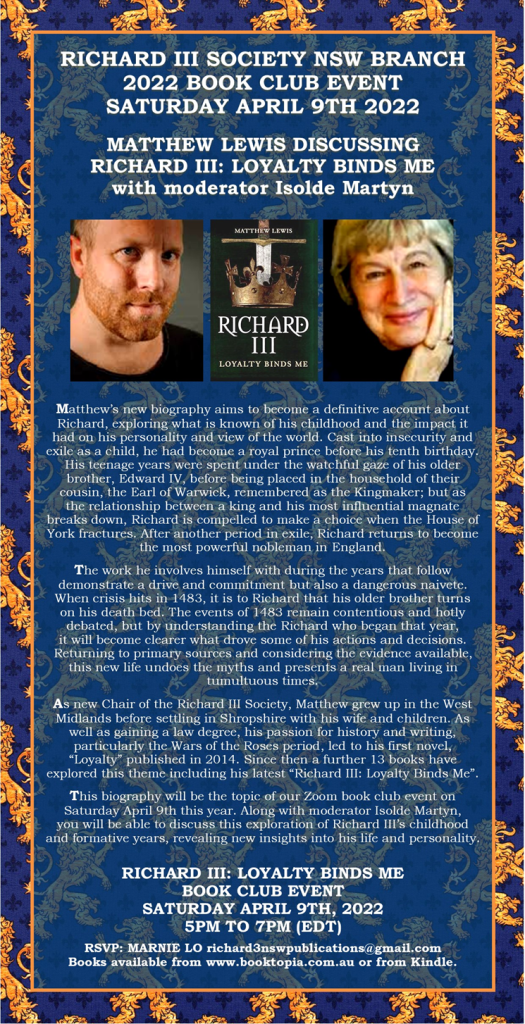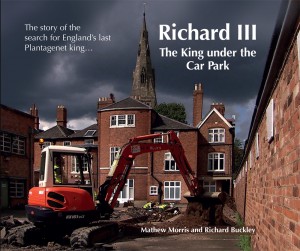Search Results for: Matthew Lewis
KRA Week 2013-3: History & Law – Author Matthew Lewis
Links: King Richard Week 2013 & Quiz
♕ ♛ ♕
Interview with author Matt Lewis
about
his research & King Richard III
First of all, I need to confess, having such a knowledgeable author and researcher as interview partner let my curiosity run away with me. I hope you will enjoy the wonderful and insightful answers by author Matt Lewis.
Matt Lewis also currently publishes a series of articles in defence of King Richard III on the Royal Central blog
- The Real White Queen? A Defence Of King Richard III (02.08.2013)
- The Defence of Richard III Part 2 – The Foundations of Evil (06.08.2013)
- The Defence of Richard III Part 3 – To Kill A King (11.08.2013)
- The Defence of King Richard III Part 4 – Bosworth, Shakespeare & That Horse (22.08.2013)
and an interview by Karen Kilrow with more background was published there (13.07.2013).
But now to the interview and my curious questions:
Can you tell us a bit about yourself and your historical background?
I have been passionate about history since school, where it was my favourite subject. I studied the Wars of the Roses there and it immediately grabbed me. The intricacies of the family ties, the loyalties and the betrayals are like the plot of the most complex tv series you ever watched, only this was real people’s lives being torn apart.
The story of Richard III was also something I was immediately fascinated by. The difference in his reputation before 1483 and after was so diametrically opposed that it just didn’t make sense. I had to learn more! An interest became a passion. I read book after book about the Wars of the Roses and Richard III and the more I read the more convinced I became that something was amiss.
How does your legal background fit into your interest for history?
At university I studied law and even that seemed to complement the study of history. I find that having a law degree complements an interest in history very well. A solicitor I worked for once told me that no one knows all of the law, the trick is knowing how and where to find what you need. This principle applies to history too. No-one knows all of history.
The skills of research are the same. A law degree teaches you how to find facts, examine and understand them from all angles, to view things from the perspective of others and then present your findings. Historical research is identical. When writing fiction, legal training helps further because it teaches you to understand the facts and then make them prove what you need them to prove!
Why is it so difficult to get unbiased research into the life and times of Richard III, even more than 500 years after his death?
It is hard to understand why Richard III doesn’t get the kind of impartial study almost anyone else does. I think it is due in part to history, for purposes other than academic study, liking to box people up neatly as ‘goodies’ and ‘baddies’. The Tudors followed Richard and were keen to present a picture of an England ravaged by tyranny from which they saved a grateful people. Obviously he was then maligned by Shakespeare and that image of him stuck. There has always been a core of historians keen to shine the light of fact on his reputation but it has been hard to fight against a presumed, accepted image. Because of this the argument becomes more polarized as some believe him an evil tyrant and others try to paint him as a saint. Somewhere in the middle the real man is lost. He was neither a saint nor a demon and until the argument moves away from such passionate polarization it will always prove hard to judge him dispassionately.
Might this difficulty to get some resemblance of ‘justice’ for a historical figure have something to do with the current royal family descending from those getting into power after the Battle of Bosworth or the perception of a need to legitimize the later religious separation from Rome or have something to do with a modern interpretation of what monarchy and democracy should be or do?
I think that the present royal family have little impact on the study of the history of personality. They would, I suppose, have a vested interest in the institution of monarchy and so would not wish to become embroiled in any kind of discussion of rights and wrongs. To do so opens them up for such criticism in the future. It is for this reason, I suspect, that the royal family is not keen to allow the opening of the urn in Westminster that supposedly contains the remains of the Princes in the Tower and of other royal tombs such as Edward IV’s for DNA comparison. I doubt that it relates to insecurity or rivalry but rather to the sanctity of those graves. There are human beings resting in peace there. If permission were given now, the same could happen in the future to those still alive now and they may well not want that. Whatever the rights and wrongs of Bosworth, Henry VII was anointed king, whether by right of blood or conquest becomes irrelevant. No-one could challenge the legitimacy of the current royal family now on that basis. If we look further back, Edward IV took the throne by force, as did Henry IV. Do we then head back to William the Conqueror?
Will finding the ‘real’ King Richard III now help with the research to also start the search for the ‘real’ person, not the legend?
The discovery of Richard III’s grave is an opportunity that I hope will be exploited to the full by those seeking a re-evaluation of his reputation. I noticed a real surge in sales of my novel when it was announced, so clearly interest has been captured and just needs to be exploited. The White Queen series has drawn attention to the Wars of the Roses period too. Visitors are pouring in to the exhibition at Leicester and I hope that they will be taking away a different perspective on him, if they are not already Ricardians! I was lucky enough to visit the dig site at Greyfriars on one of the open days and it sent a chill down my spine to think that I could be standing so close to the remains of a man I had studied for so long. I was like a crazed fan. I find it amazing that after everything that has happened on that site – the demolition of the monastery, the building of the mayor’s house and gardens, the demolition of that and all of the subsequent Victorian work, not to mention the laying of the car park – that his grave remained intact and unspoiled, missed by every pick axe and digger that had been on the site. His funeral will be another huge event, unlike anything we have seen before. It would be fantastic to make it there and I will be doing my best to attend some part of it.
I hesitated a bit with the following question, not wanting to heat up the brewing battle. But Matt Lewis answered my question about King Richard III’s last resting place with grace and historical knowledge, so I need not have worried:
With all the discussion about the ‘Battle of the Cities’, what is your position regarding the fighting towns York and Leicester?
In terms of where he should be laid to rest, I have no issue giving my preference. From the very outset there has only been one place that I believe he should be buried and that is Westminster Abbey. He was a king of England and deserves no less. Much has been made of Leicester’s right to him and York’s desire for him. Indeed, it has been claimed that he wanted to be buried at York Minster. Whilst he was lord of the north for his brother this may have been his intention but by the time that he died he was King of England. The clearest indication of his final wishes is the fact that he had his wife buried at Westminster. He may well have intended to have their son moved there from Middleham too, but I think Anne’s presence at Westminster tells us all that we need to know about his wishes.
How do you see the legal aspects of the appeal by the relatives of King Richard III, the Plantagenet Alliance?
The legal challenge that has been brought is flawed in so far as those bringing it are not descendants of Richard III, they are descended from his siblings. It is also my understanding that the reburial of remains discovered during an archaeological dig does not require consultation with the relatives where the remains are over 100 years old, as those of King Richard clearly are. Best practice is to have remains interred at the nearest church or cathedral to the location they were discovered too. Leicester University appear to have done all that was required of them and I suspect that their wish to have him buried at Leicester Cathedral will be, in the end, granted.
You wrote a historical novel about Richard III, clearly depicting Richard III as human being, not the caricature not only Shakespeare, but also some historians made and still make him.
What is your reason to do so and where do you see you have to add to all the previous works and novels about Richard III?
I wrote my novel as an indulgence really. It took about 10 years of picking it up and putting it down but I enjoyed writing and researching it. I tried to remain as historically accurate as possible, not least because the true story is far too interesting to have to invent anything! The book looks at the more domestic side of Richard’s life from the Battle of Barnet when he helped his brother Edward IV regain his throne to Bosworth. Most people know about the battles he fought, the seizure of the throne, the Princes in the Tower and the Battle of Bosworth but I wanted to explore him as a more rounded person, at home with his wife, relaxed with his friends, but still dealing with huge issues of national importance. ‘My’ Richard has faults, too. He is far from perfect. His temper is short and his inability to understand those who do not share his views leave him politically naive and exposed. The actions that he takes in the book broadly follow the known history, so if he attracts sympathy for his actions, it is because he deserves it.
Whatever you decide about him by the end, at least it will be based on fact rather than accumulated mythology.
Studying law helps to view things dispassionately, to detach from them and present them objectively. I am an ardent Ricardian, though I don’t necessarily belief he was without fault. I hope that by presenting a man trying his hardest to make his way in a hostile, uncertain world, struggling to protect his family, I could balance out the saint v tyrant argument a little.
To what extent is your work “Loyalty” based on the research by Jack Leslau about the image interpretation and connection between Sir Thomas More and Hans Hobein? (Research presented on the website: www.holbeinartworks.org)
I first read a brief reference to Jack Leslau’s work in A.J. Pollard’s King Richard III and the Princes in the Tower. It fascinated me and I read more. The more I learned the more interesting it became. In the end it provided the frame through which Richard’s story is told, so there is no doubt that it influenced me a great deal. Ricardians will probably know what that means for the story, but it is not well discussed beyond this. The sequel, which is nearing completion, follows both threads of this story to something which I believe is entirely new. At least I have never come across my next theory before! Holbein returns and we also follow the aftermath of Bosworth as those loyal to Richard who survive try to find a place for themselves in a changed world, a world that hunts them.
You wrote two further works about King Richard III and the Wars of the Roses. Both are rather short volumes with highly condensed information, giving an excellent overview of events and happenings.
What was your reason to write those and for which audience are they intended?
I have begun a series of brief factual history books offering my take on the period I love. A Glimpse of King Richard III was born of the new interest in the king and is a very short biography. It is aimed squarely at those interested in the subject because of the recent discoveries and discussions but who do not wish to dive into a weight biography – though I enjoy these immensely, they are not for everyone. I thought those with a casual interest might pick it up and hopefully put it down with a different perspective on King Richard III. A Glimpse of the Wars of the Roses adds depth to the subject but is also brief, beginning with the roots of the conflict and then following the chronology of the politics and the battles. Again, with interest high and The White Queen drawing much attention, I thought some with a more casual interest in the period might find it interesting. There is more to come in the series too. Hopefully people will enjoy my lighter take on the complexities of the period.
Book publications currently available by Matthew Lewis on Amazon.com / Amazon.co.uk
:
* * *
* * *
* * *
Links: King Richard Week 2013 & Quiz
Matt Lewis – New Podcast series about King Richard III (iTunes)
Matt Lewis (Blog) (March 18, 2014)
Matt Lewis – New Podcast series about King Richard III (iTunes) by Matthew Lewis –
Author Matthew Lewis (Interview on KRA, 23.08.2013) shares his rich knowledge about King Richard III and his time in his books, but now also in podcasts, shared on iTunes and via video recordings on YouTube:
- The Richard III Podcast – A Perfect Coup (04.03.2014)
- The Richard III Podcast – Introduction (09.03.2014)
- The Richard III Podcast – Episode 2 – The Cat Who Got the Cream (18.03.2014)
Video-recordings also available via the YouTube channel of Matt Lewis.
Richard III – Event on April 9th, 2022
After the long pause in posting, it is an especial pleasure to announce an event that includes two Richard III-experts we have already interviewed here on the KRA-website.
In the New South Wales-branch of the Richard III Society in Australia, Isolde Martyn will moderate the bookclub-discussion with Matthew Lewis about his book “Richard III. Loyalty Binds Me”. He has various well known publications about King Richard III we linked to here on KRA already. He also showed his expertise with his knowledgeable answers in our interview from the year 2013, “History & Law – Author Matthew Lewis” (August 23, 2013). Since then, he became head / Chair of the Richard III Society.
- Interview for Plantagenet Society of Australia (26.08.2011)
- Interview about author Isolde Martyn (14.03.2013)
- Book about Jane Shore “Mistress to the Crown” (2/2013)
- Book “The Devil in Ermine” (2013) – King Richard III in the year 1483, from the perspective of his cousin, the Duke of Buckingham.
- History & Law – Interview (23.08.2013)
- Book about King Richard III “Loyalty Binds Me“
- Podcast-Series (iTunes)
The bookclub-event will take place on Saturday, 9th of April 2022, and is held online via Zoom. They still have some places left to join in, even if you are not member of the NSW- RIII Society. So please check for your local time, if you want to take part.

Please reserve your spot via e-mail to Ms. Marnie Lo (e-mail in image – and not repeated here to avoid spam.)
Local times, e.g.
- Auckland, N.Z. 7 – 9 p.m.
- New York, U.S.A. / Ottawa, Canada 3 – 5 a.m.
- London / Belfast 8 – 10 a.m.
- Paris, France / Berlin, Germany 9 – 11 a.m.
I am very much looking forward to the event!
All the best to you and stay healthy and safe !
The battle for Bosworth field: Historians react to decision to build on battlefield where Richard III died
BBC History Extra (October 4, 2018)
The battle for Bosworth field: Historians react to decision to build on battlefield where Richard III died by Rachel Dinning –
Historians Mike Pitts, Matthew Lewis, George Goodwin, Diane Purkiss and Michael Jones give their views about the Battlefield of Bosworth, where King Richard III died in 1485. What knowledge is still to be had from a battlefield, of which the exact location was found out only a few years ago? Would it be worth it to destroy the access to a field exactly at a moment, when technology finally catches up with the historical research about the time and could supplement and extend the knowledge about fighting methods, but also about the society of the time?
Richard III – The Answers
Matt’s History Blog (March 26, 2015)
Richard III – The Answers by Matthew Lewis –
A historically well founded article about King Richard III, contradicting David Starkey’s remark live on TV about Richardian as “loons”.
Richard III: Stop looking for a saint or demon and try to find the man
Leicester Mercury (November 12, 2014)
Richard III: Stop looking for a saint or demon and try to find the man by Matthew Lewis –
A very gripping account regarding King Richard’s fight for power and the rivaling factions plotting for their own reasons.
Read more regarding Matthew Lewis’ research in his publications and the interview with him here on the KRA website.
Did Richard III murder the princes in the Tower? You debate
BBC History Extra (May 16, 2014)
Did Richard III murder the princes in the Tower? You debate by Emma McFarnon –
In this article, author Matthew Lewis (interview on KRA) very proficiently defends and discusses the case with student Julian Sutcliffe (in favour of King Richard III’s guilt).
Sudeley Castle, April 2014
Matt Lewis (Blog) (April 22, 2014)
Sudeley Castle, April 2014 by Matthew Lewis –
Sudeley Castle once (or better twice) belonged to Richard Plantagenet, Duke of Gloucester and the later King Richard III. The ruin of parts Richard III let build are still visible. Matt Lewis draws a vivid picture of this historic place and the people who formed and built it.
King Richard III & Envy
In my whole observations about the research concerning King Richard III, I always wonder, why everybody thinks to be able to judge him on some prejudice, rumour, envy or other motive and readily dismisses valid research done on a broad basis evaluating the available material.
A historian is bound to build as complete a basis for a research as possible and only after reviewing all (!) available sources, is allowed to come to a conclusion and has to argument from all possible angles the validity of the own conclusions.
So you will find me shaking my head in utter astonishment concerning the current discussion about King Richard III, which gets high press coverage in renowned newspapers and magazines.
I also find it hard to decide how best to present this new discussion to you, as in the major part it is so nonsensical, that I wonder why it gets so much and famous attention at all.
First I want to state that I am in no way connected to or bound to defend the University of Leicester and one certainly can argue if all researches done by them were necessary or interfered with the dignity of the person of King Richard III, but this current discussion certainly shows they were exceedingly necessary.
The argument now raised against the University of Leicester and their result to confirm the identity of the found skeleton as being of King Richard III, is that the skeleton could easily be of some other soldier buried there, just conveniently being of the direct female line leading to King Richard III’s mother.
How many unaccounted for relatives, having the exact female blood line of King Richard III, do you think are lying around somewhere? Or better are lying around at the exact spot King Richard III should be? And in addition have died in the Battle of Bosworth or by incident around that time near Leicester, so that they are buried in the Grey Friars’ Abbey? While just in the late court battle, one of the main arguments against a burial in Leicester is, that King Richard III’s family just had no connections to Leicester? So how can forgotten relatives turn up there? And were the ‘grey friars’, while so discriminating in burying people in the choir of their church, suddenly burying soldiers from the battlefield, carting them all the way from the Bosworth battlefield? Why then were only so few skeletons found and not hundreds and only one with battle marks? Oh, and what a strange method to bury them without clothes and with bound hands? Really, the ‘grey friars’ must have had no piety at all…
I could go on much longer, as a result of the conclusive multitude of researches done by the University of Leicester and though some think it may now be enough research done on the skeleton of King Richard III, still the results in their entirety (not necessarily one taken on its own) give us a very complete and convincing affirmation of the skeleton’s identity as being King Richard III.
Especially helpful in that regard to see the full picture of research results and why they were done, is the excessive pre-research done by Dr. John Ashdown-Hill, who with great determination researched the potential last burial place of King Richard III from all historical angles and laid down his progress of research as well as the conclusions he came to in his work “The Last Days of Richard III”, which we have recommended here repeatedly, as it is the go-to research which was essential in finding King Richard III.
You see, I think the counter-argument just is so far-fetched as envy possibly can make it. Perhaps, it is due to scholars feeling left out from the euphoria and joy over the find in Leicester and now try to jump on the media attention created by the extraordinary research results in Leicester.
I just don’t get it, why the media jumps on this envy train so readily and let itself be used in such a way.
The news stream includes the articles of this new conflict in the sidebar and in the 2014-archive (entries dated around the end of March 2014).
But it provides heated arguments and is one more battle area in the new “Wars of the Roses” or rather a new skirmish.
(I am quite certain the list of battles around King Richard III will have to be continued …)
But now to something creative and constructive about King Richard III:
♛ King Richard III ♛
Matt Lewis – New Podcast series about King Richard III (iTunes)
- The Richard III Podcast – A Perfect Coup (04.03.2014)
- The Richard III Podcast – Introduction (09.03.2014)
- The Richard III Podcast – Episode 2 – The Cat Who Got the Cream (18.03.2014)
Also available via the YouTube channel of Matt Lewis.
Books & King Richard III
♛ King Richard & Books ♛
Christmas is coming up and as books still are one of the most favourite presents, I collect some reading tips here for you.
Not that I get through the multitude of new publications about King Richard right now – and some books still await me at Christmas – but there are new books I especially wanted to bring to your attention and recommend here, as I enjoyed reading them myself.
If you have books you would like to add to this recommendation, please feel free to either post them in the comment section of this post or send me a mail (contact form) to write and explain more about your recommendation and why you like the book(s).
Victoria Smith let us know her favourite King Richard III novel “The Murders of Richard III” by Elizabeth Peters and especially wrote a review for us.
(As usual here on KRA, earnings from embedded affiliate links on this site go to the charities recommended by actor Richard Armitage on his JustGiving page.)
♛ King Richard & Jane Shore ♛
Isolde Martyn – “Mistress to the Crown”
“Mistress to the Crown” follows the life and struggle for freedom of Jane Shore, the famous and influential mistress of King Richard III’s oldest brother, King Endward IV.
Her life never appeared to me as an especially romantic one, so a novel about Jane Shore coming out in a publishing house known for its extensive romantic novels instantly got my full interest.
From my previous comments about other works of the author Isolde Martyn, you already know that I adore her writing style.
Isolde Martyn also does not disappoint in this novel:
- Her writing is fluent and gripping that once I began reading, I could not put the book down. Though I already know the story of Jane Shore, I still needed to know how her life and fate unfolds in the story.
- The historical research which went into this novel is extensive and far beyond what I would normally expect from a historical novel. So for me, Isolde Martyn’s novels clearly are in a ‘historical novel’ class of their own.
But the astonishing part of this for me is, that the books do not appear like a historical lecture, but unobtrusively and fluently the fate of Jane Shore unfolds in a way where I begin to care for her, while I never felt very ‘understanding’ for her and her fate before. - For all King Richard interested readers, of course King Richard plays his role in the book as well, though more as a background figure, but still actively influencing the fate of Jane Shore.
At the time of the first English publication (03/2013), we published an
interview with author Isolde Martyn (14.03.2013).
Now, the book is also available in a German edition:
(The print edition was not available via Amazon.de at the time of the post, but should be shortly. If you want to order it for Christmas, here is the direct link to the publisher.)
Links to the English version:
♛ King Richard & Art ♛
Author Matthew Lewis (interview of 27th of August 2013, with book links) in his novel “Loyalty” follows Jack Leslau’s (http://www.holbeinartworks.org/) research and picture analysis and brings King Richard III in connection with the Holbein household.
♛ King Richard & Research ♛

Mathew Morris & Richard Buckley: Richard III. The King under the Car Park. The story of the search for England’s last Plantagenet king…
University of Leicester: ‘Beyond reasonable doubt’: archaeologists give first-hand account of Richard III discovery in new book, by Peter Thorley (04.11.2013)
From the intense research done to find and identify King Richard III, I must admit, I had expected a big volume of a book. The publication is a rather slim one, but so much filled with detail and information, that I am not the least bit disappointed.
Though much of the information and material had been published in the press already, the explanations and collection of image material and details known about King Richard III is unique and I am very glad to have this book as a valuable reference about the last days of King Richard III as well as his discovery in Leicester.
So though the book is not a detailed description about how King Richard III was found in Leicester – go to the publication by Philippa Langley and Michael Jones for that – I really can recommend this book for the invaluable collection of research results.
Philippa Langley/Michael Jones: The King’s Grave
Dr. John Ashdown-Hill did the essential research to enable the following work by the University of Leicester to find King Richard III.
His publications show the fascinating search for details so far missing or overlooked, but which proved to be exceedingly necessary to the final search:
More details about Dr. John Ashdown-Hill.
Just recently published:
Dr. John Ashdown-Hill also works on a new publication about King Richard III’s brother, George Plantagenet, the Duke of Clarence – you know the always irritating one where legend has it that he ended in a butt of Malmsey wine.
Announced for March 2014:






